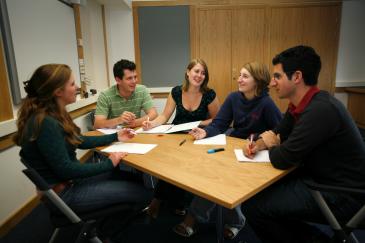Supervisions, supervisees and supervisors
Undergraduate education at Cambridge is designed to encourage rigorous, critical thought and a profound understanding of a chosen field of study. Supervisions are a core element of that education and rely on mutual respect and co-operation between students and supervisors, to develop opportunities for students to learn during the course of their degrees how to work autonomously, learning with and from each other and from their supervisors.
These pages contain information for new undergraduates and for new supervisors.
An overview of undergraduate education, including mutual expectations of students, supervisors and Directors of Studies, is available on the University website.
Some fundamental aspects of supervisions
Supervisions rightly vary between different subjects, supervisors and students. There are some common aspects, however, and these are summarised here.
- To be effective, supervisions require appropriate preparation by both students and supervisors.
- Supervisions provide an opportunity for students to learn from each other as well as from their supervisors. This means that students and supervisors should contribute actively during supervisions, as well as showing consideration for each other’s reasoning.
- Supervisions provide an opportunity for feedback on supervision work and discussion of questions and the subject. Feedback can take the form of written comments as well as discussion between student and supervisor.
- Students and supervisors should think about how to use feedback in order to improve students' understanding and work.
- Supervisions should be a regular commitment in the timetables of students and supervisors.
- Under exceptional circumstances, a student or supervisor may not be able to attend a supervision. In these instances, every effort should be made to ensure that advance notice is given in good time.
- Additional supervisions may be arranged only with the agreement of the relevant Director of Studies.
- Students and/or supervisors who are concerned about progress in supervisions should first try to understand and resolve issues themselves.
- If concerns persist, students and/or supervisors should discuss these with the Director of Studies as soon as possible, rather than waiting for end-of-term feedback and reporting.
Some student views
It took me a while to realise that supervisions are a learning opportunity, rather than a test of knowledge." (First-year Science student)
Some of the questions that I'm asked in supervisions are challenging. They make me think in a way that I'm not used to having to think and are very helpful." (First-year Humanities student)
The feedback I’ve got from supervisors has been incredibly helpful. They are very good at homing in on and explaining the specific parts of the work I would struggle with. Being challenged in supervisions has been very helpful, too. Instead of settling on any old right answer, you’re encouraged to work yourself towards the best solution, which I really appreciate" (First-year Science student)
Talking through ideas we’ve had in our essays and expanding on them in supervisions really helps me. We discuss different ways of writing an essay, share ideas as a group and allow them to change and adapt with other people’s ideas" (First-year Humanities student)
